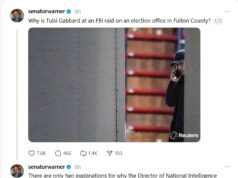In a piece here a few days ago, i.e. the day before AG nominee William Barr appeared at his hearing before the Senate Judiciary Committee, I expressed a degree of hope that Barr would do right by the Mueller investigation. In the wake of those hearings, I ask myself if my hope was misplaced.
My answer is that I continue to hope, but my misgivings are stronger.
Pretty much all the people I respect that I’ve heard discuss Barr’s testimony (Adam Schiff, Jerry Nadler, and others) have expressed serious concerns. Barr has fallen short of making the kind of firm commitments that Eliot Richardson made in similar circumstances. And there are especial concerns growing out of the ways Barr talked about what he’d do about making the report he would receive from Mueller fully available to the Congress and the American public.
But two of those legal experts whose comments I’ve followed saw Barr’s lack of guarantees as quite possibly signifying NOT an intention to serve Trump over the rule of law but as something more benign. Former federal prosecutor Harry Littman (a regular on MSNBC) and Harvard professor of constitutional law Lawrence Tribe saw Barr as having to walk a narrow line to avoid –even at this stage — running afoul of the President who nominated him. (Apparently, it is known that Gorsuch made some statement during his hearings that tempted Trump to withdraw that nomination.)
That, and there is also Barr’s wanting to define his position “by the book,” not giving away any of the usual authority that goes with the office. (For example, he would not COMMIT to recusing himself if so advised by the DOJ ethics people– choosing rather to maintain the “by the book” response according to which the AG is not REQUIRED to follow such advice, but is entitled ultimately to decide according to his own judgment.)
But even so, Barr gave reasons for concern.
Especially concerning to me is the argument he seems to have put forward that seems to me indefensible: namely that he would follow the general prosecutorial practice of NOT making public negative information about a target if no indictment is brought against that person, while apparently ALSO following the DOJ rule that says that a sitting president CANNOT be indicted. As Prof. Tribe noted, that creates a kind of Catch-22: if the President is unindictable (but can only be impeached), and if negative information gets made public only about a defendant who is being indicted, how can either the Congress or the public make the necessary decisions about the one recourse available regarding a criminal President, i.e. impeachment?
Also concerning is what seems a foolish way of thinking exhibited in that 17-page memo he wrote questioning aspects of the Mueller investigation: namely, his argument that a President cannot commit a crime while exercising his constitutional powers, e.g. to fire the head of the FBI. He leaves out the vital concept of “corrupt intent.” Nixon’s articles of impeachment included exercises of constitutional powers, but found them criminal because the PURPOSE for which he exercised them was illegitimate.
Nonetheless, despite all that, despite the real possibility that I’m overly optimistic — and despite my sense that Barr falls far short of being the AG this nation should have — if I had to bet, I would continue to bet as I did a few days ago: that Barr — for whom as this appointment will be the conclusion of a mostly respectable career (Barr is 68), who I expect will be concerned with how history will judge his legacy — will deal with the Mueller investigation and report with integrity.
One last point of reassurance: Nick Ackerman (a former attorney in the Watergate investigation, of whom I am a great fan) expresses complete confidence that one way and another, whatever Barr does or doesn’t do, the full body of Mueller’s findings will come out, that Congress and the people will get to see the whole picture.


![[UPDATED 1/29/26] Audio: Sen. Tim Kaine Talks to Blue Virginia About His “Five-Point Plan” to Fight Trump’s Orban-Like Assault on US Democracy; Civil Disobedience a la MLK Jr.; Trump’s Bogus “Energy Emergency”; the Crucial Importance of the 2025 VA Elections; etc.](https://bluevirginia.us/wp-content/uploads/2025/02/kaineinterview2-238x178.jpg)






![[UPDATED 1/29/26] Audio: Sen. Tim Kaine Talks to Blue Virginia About His “Five-Point Plan” to Fight Trump’s Orban-Like Assault on US Democracy; Civil Disobedience a la MLK Jr.; Trump’s Bogus “Energy Emergency”; the Crucial Importance of the 2025 VA Elections; etc.](https://bluevirginia.us/wp-content/uploads/2025/02/kaineinterview2-100x75.jpg)

